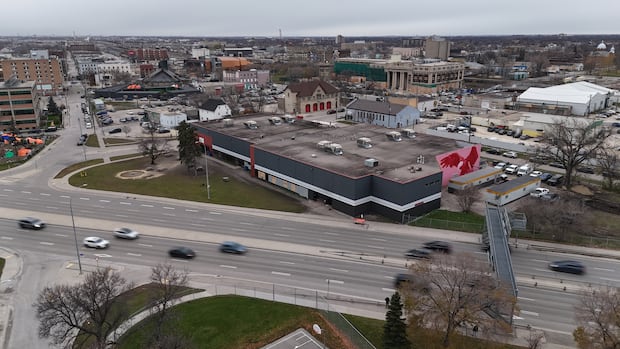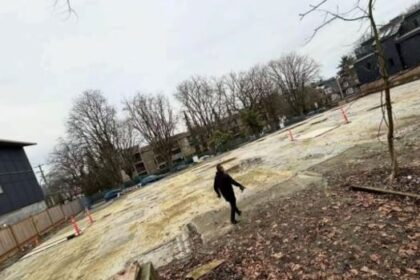ManitobaA facility where people who are intoxicated can be detained for up to three days is slated to begin accepting people by the end of the month, Manitoba Premier Wab Kinew says.Facility expected to be fully operational in December, Wab Kinew saysBrittany Hobson · The Canadian Press · Posted: Nov 06, 2025 2:28 PM EST | Last Updated: 8 hours agoListen to this articleEstimated 4 minutesThe audio version of this article is generated by text-to-speech, a technology based on artificial intelligence.The intoxicated people detention facility will be at 190 Disraeli Fwy. The premier said the new facility will offer compassionate services that are often not seen in so-called ‘drunk tanks,’ where people may be lodged in cells. (Trevor Brine/CBC)A facility where people who are intoxicated can be detained for up to three days is slated to begin accepting people by the end of the month, Manitoba Premier Wab Kinew says.Kinew announced the timeline on Thursday, a day after the legislature passed a bill to extend the amount of time intoxicated people can be detained, from the current 24-hour maximum to 72 hours.The change is intended to allow longer detention of people on methamphetamines and other long-lasting drugs.Kinew told reporters at an unrelated event that the facility in Winnipeg’s Point Douglas neighbourhood could start accepting detainees in the next two weeks, and is expected to be fully operational as of December.The new facility will offer compassionate services that are often not seen in “drunk tanks” where people may be lodged in cells, the premier said.”The new facility is going to be more humane, more dignified, but most importantly, it’s going to be somewhere where somebody who’s causing problems on drugs can be taken so that they’re not in the emergency room waiting room, they’re not at the bus stop, they’re not bugging you while you’re trying to go to the grocery store,” Kinew said.The program will initially have police work with Health Sciences Centre and detention facility staff to determine when people under the influence need to be diverted from emergency rooms, he said.Employees from the non-profit Main Street Project will staff the facility, along with paramedics and health-care staff.The government said it consulted with doctors working in the addictions field who were in favour of the approach, stressing there needs to be addiction support and resources at the facility.”We want to ensure that we are meeting people and supporting, and ensuring that they can get onto a path of recovery,” said Bernadette Smith, minister of housing, addictions and homelessness.The NDP government bill was supported by first responders, some parents of addicts and Winnipeg Mayor Scott Gillingham, but also led to weeks of political debates.Jeff Bereza, addictions critic for the Progressive Conservatives, called the facility a “terrible” idea for people suffering from meth psychosis, which he said can last longer than three days.”Drug dealers are going to know where their customers are,” he told reporters on Thursday. “They’re going to use drugs and be right in the front door. How is that helping Manitobans get better?”The Progressive Conservatives proposed amendments to the bill that would require annual reporting on the number of people being detained, forbid protective care centres within 500 metres of schools, daycares and similar buildings, and require public consultations on new sites. The amendments were defeated by the NDP majority in the chamber.The NDP said the Tories’ call for 500-metre buffer zones was unworkable. The Tories said they supported the bill’s aims but wanted to incorporate changes based on public feedback in a recent committee hearing.The bill was also criticized by some community groups who said holding people against their will for up to 72 hours effectively criminalizes addiction.The bill, expected to become law in the coming days, requires that a detained person be assessed at “reasonable intervals” to gauge their intoxication. They are also to be seen by a health professional after 24 and 48 hours.WATCH | Psychiatrist raises concerns over 72-hour detox centre:Psychiatrist raises concerns over 72-hour detox centreA Winnipeg facility where highly intoxicated people can be held up to 72 hours is expected to open at the end of the month. Despite concerns from some, including Manitoba’s former chief psychiatrist, the government is defending its decision to move quickly. ABOUT THE AUTHORBrittany Hobson is a reporter with The Canadian Press.With files from CBC
Friday, 6 Feb 2026
Canada – The Illusion
Search
Have an existing account?
Sign In
© 2022 Foxiz News Network. Ruby Design Company. All Rights Reserved.
You May also Like
- More News:
- history
- Standing Bear Network
- John Gonzalez
- ᐊᔭᐦᑊ ayahp — It happened
- Creation
- Beneath the Water
- Olympic gold medal
- Jim Thorpe
- type O blood
- the bringer of life
- Raven
- Wás’agi
- NoiseCat
- 'Sugarcane'
- The rivers still sing
- ᑲᓂᐸᐏᐟ ᒪᐢᑿ
- ᐅᑳᐤ okâw — We remember
- ᐊᓂᓈᐯᐃᐧᐣ aninâpêwin — Truth
- This is what it means to be human.
- Nokoma










